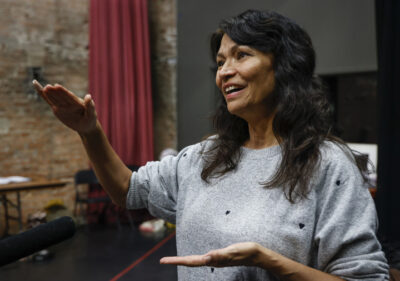Blackfoot cast takes to the stage for O’KOSI
By Ry Clarke on September 23, 2022.
 CANADIAN PRESS PHOTO
Director Michelle Thrush gestures as she discusses the play "O'KOSI," in Calgary.
CANADIAN PRESS PHOTO
Director Michelle Thrush gestures as she discusses the play "O'KOSI," in Calgary.Making Treaty 7 Cultural Society is presenting O’kosi, In the Fall When we Gather, a multidimensional play that explores the multi-generational effects of the signing of Treaty 7 and the Indian Act.
The play is being presented in the Victor Mitchell Theatre at the Pumphouse Theatre Complex in Calgary until Oct.1.
Director Michelle Thrush brings a talented cast of Blackfoot actors together, writing and staging the visual experience with music and poetry. O’kosi depicts the way Indigenous people heal from the effects of the events and how the repercussions of these policies have been passed down across generations.
Set in Mohkinstsis (Calgary) from 1877 to 2077, the play shifts towards breaking colonial systems, reuniting families, and healing communities.
Born and raised in Mohkinstsis, Thrush is the artistic director at Making Treaty 7 and is best known for her role as Gail Stoney in Blackstone.
The Gemini Award winner has been an actor, writer, and director for over 30 years.
“Knowing Michele Thrush was going to be directing it, and working with Making Treaty 7 in the past, made me want to be back in the theatre world again,” said Dustin Frank, playing the role of Jordan in O’kosi.
I play this video gamer, he’s kind of very involved in his digital world. So he doesn’t know much about his past and who he is as an Indigenous man. There’s a reluctance to really connect to his culture. Which stems from that fact that his world was torn apart when he was younger, ripped away from his family, growing up in a white Polish-Canadian family. So now he feels so lost that if he was to try to connect with his people, he’s afraid of rejection.”
The play tackles the theme of how history is carried through our generations and the lasting effects trauma can have.
“We have touched on a lot of stuff, like how the treaty itself was filled with broken promises. There are a lot of things at the root of it all, these different treaties and Indian Act had different bits of legislation that were meant to break these families apart. Because if they didn’t have connection to their family, they could not practice their traditional ways,” said Neil Fleming, executive director at Making Treaty 7.
“The characters we are seeing are representative of Indigenous people over the span of 200 years, from 1877 to 2077. How different families have been broken up.”
Both Fleming and Frank say the work on the play has been a personal journey and reflects who they are as both actors and Indigenous peoples.
“Making the characters come to life and seeing a lot of my fellow actors go through this journey, we are going through this personal journey,” said Frank.
“It’s empowering for local Indigenous communities to see their stories being presented back to them in such a positive way,” said Fleming.
For the first time Making Treaty Seven will adopt a pay-what-you-can model for theatre goers, giving audiences a theatrical look at Indigenous culture and history with insightful thoughts towards healing.
“I hope that it gives people a better look at the injured, intergenerational trauma that we’ve experienced as Indigenous people. Where we can go from there and how we can give them the knowledge and the tools for our youth to come out and learn about who they are, not being afraid to do so,” said Frank.
17-16




